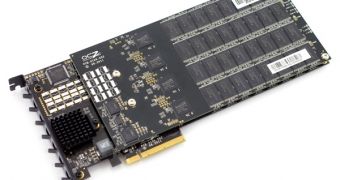OCZ's latest solid state drives are going to be used in Colfax's latest servers based on the latest processors from Intel which are designed with, you got it, the latest incarnation of the Sandy Bridge architecture: Sandy Bridge-EP.
Colfax decided to do what many other companies did, namely use Intel's newest server processors, the Xeon E5 series. Yes, the ones that are 80% better than their predecessors.
Since it was starting fresh anyway, it figured it may as well use recent storage too, so it selected OCZ's Z-Drive R4 PCI Express solid state drives.
"As part of our evaluation process in selecting a PCIe-based solution to implement in our new enterprise servers, our Fortune 1000 customers need ultimate performance, maximum storage capacity, and a controller architecture that can effectively manage all transactions without disrupting host resources," said Gautam Shah, president of Colfax International.
"We found a complete solution in OCZ's Z-Drive R4 PCIe SSDs that not only make it easy for our customers to deploy in their IT infrastructures, but also reduce their overall TCO."
PCI Express solid state drives are much faster and capacious than SATA units, hence their suitability for such applications.
Coupled with the support for the PCI Express 3.0 standard, the R4-equipped servers should easily reach throughput of 20 GB/s and a total storage space of 22.4 TB.
Predictably enough, OCZ was more than pleased with this turn of events.
"We are pleased that Colfax International selected our Z-Drive R4 PCIe SSDs to be deployed in their new enterprise server solutions that utilize the recently announced Intel Sandy Bridge Xeon E5 2600 EP processors," said Kevin Wagner, vice president of enterprise product management for OCZ Technology.
"Our OCZ Z-Drive R4 provides an exceptional combination of maximum storage IO and density while reducing the burden on host resources, resulting in a faster, more efficient solution for data center and cloud applications."

 14 DAY TRIAL //
14 DAY TRIAL //